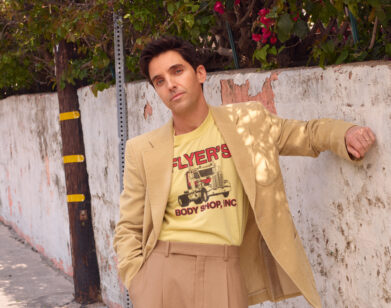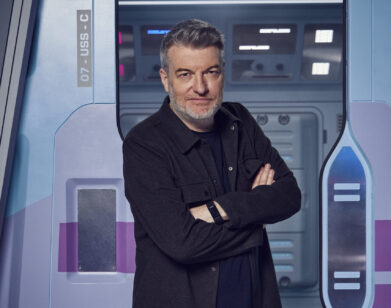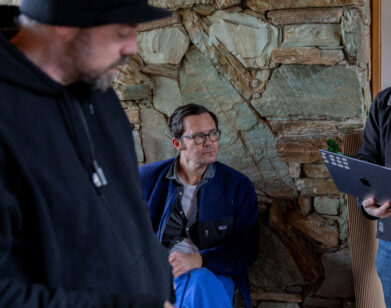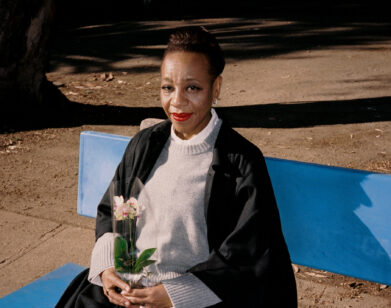IN CONVERSATION
Dan Stevens Tells Jean Smart How He Became the Reluctant Leading Man
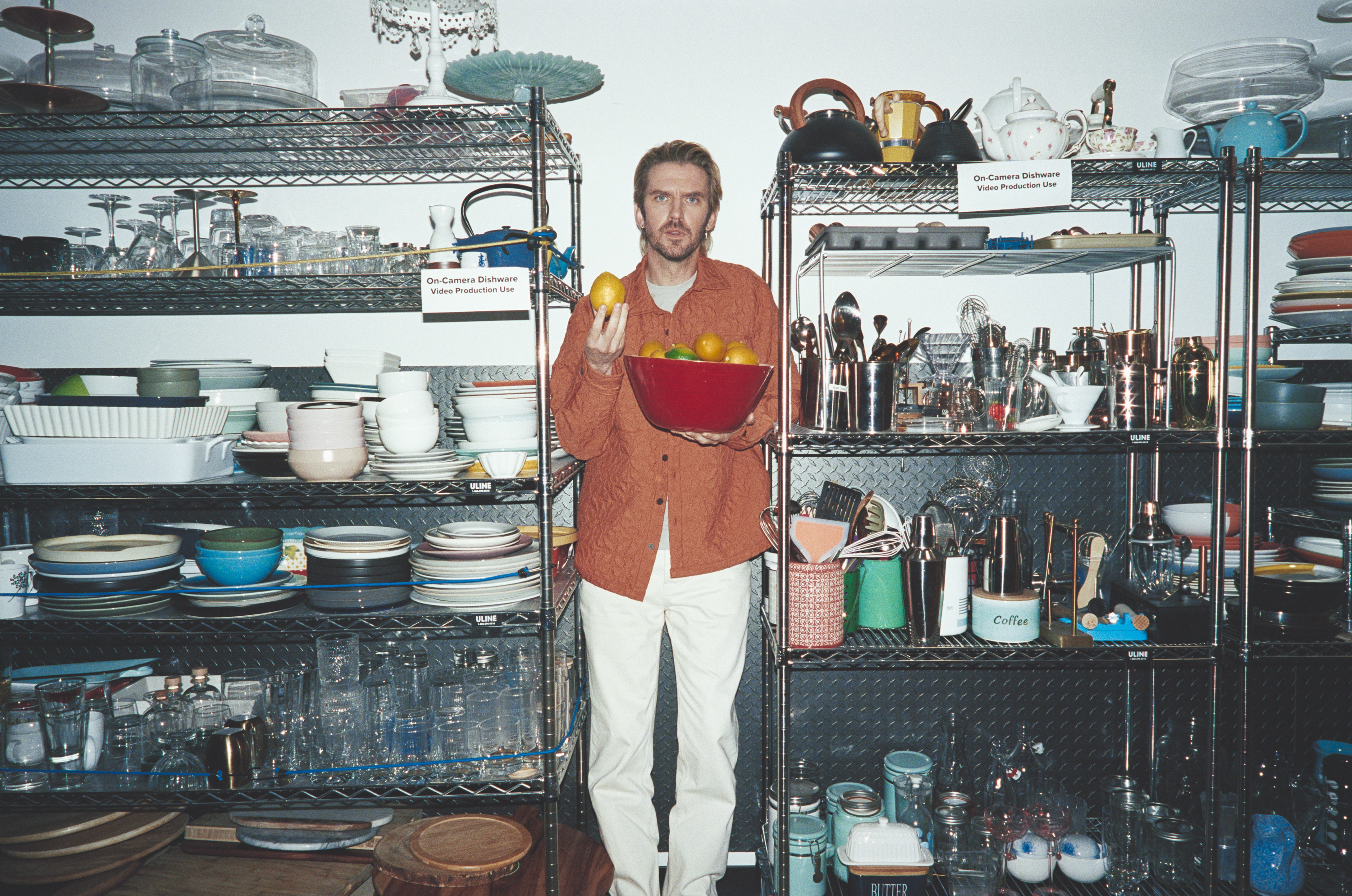
Dan Stevens, photographed by Sela Shiloni.
Following his breakout as a brooding aristocrat in Downton Abbey, Dan Stevens could have gone the leading man route. Instead, he has become one of the most quietly shape-shifting actors we have. Whether he’s a manic mutant in Legion, or a Tucker Carlson-esque media manipulator in the Netflix political thriller Zero Day, Stevens approaches each role with a careful abandon and refreshing lack of vanity rarely seen from actors of his statute. Whether he’s wrapped in prosthetics and motion-capture suits (Beauty and the Beast) or making sociopathy seem seductive (The Guest), he always locates the strangeness just beneath the surface. That same instinct for risk and reinvention runs through his Legion co-star Jean Smart, which makes their reunion the perfect set-up for a conversation about transformation, career longevity, and how social media is reshaping the casting game.
———
DAN STEVENS: Jean, thank you so much for doing this.
JEAN SMART: Oh, honey, you’re welcome. I’m flattered that you asked.
STEVENS: Were you shooting today?
SMART: No. We wrapped out of the country, and I got back a few days ago. We have one more day and then we’re done for season four.
STEVENS: Congratulations.
SMART: Now, what about you? When did you wrap your show?
STEVENS: We wrapped last year. I’m just about to go back to Australia to do another Godzilla vs. Kong.
SMART: Fun. Sorry, I’m in my bizarrely pink room. It’s not as pink as it looks on this camera. It looks like a mental institution.
STEVENS: It’s not currently decorated for some sort of seasonal purpose?
SMART: Well, I moved a year ago, but I feel like I’m still unpacking. I haven’t quite figured out my space. Anyway, I did not see episode six, and I’m dying to.
STEVENS: Well, I’m not in episode six, but I got to enjoy it as somebody who’s not in it. It’s a real thriller.
SMART: Oh my god, thriller is not the word. I was glued to the show. I’m not going to say who you reminded me of, but—
STEVENS: Oh, please.
SMART: It was so Tucker Carlson. I thought, “Where’s the bow tie?”
STEVENS: Exactly. He’s definitely on the list of people that I’ve reminded them of. We definitely wanted to make him as punchable as possible.
SMART: Well, you were wonderful. The way they treated you was upsetting.
STEVENS: I know. That’s a delightful trick, to be able to make people think, “Oh god, this annoying guy,” and then maybe feel a bit sorry for him by the end.
SMART: And oh my god, what a cast.
STEVENS: It’s bonkers. Most of my stuff was either teleprompted or with [Robert] De Niro, and so it wasn’t until the red carpet last week that I got to meet half of them.
SMART: It’s so timely that it’s kind of spooky.
STEVENS: Isn’t it? I keep getting asked, did we know? Were we sort of prophesying something? It’s like, “Well, not really.” But they were drawing on what’s been in the ether for a very long time. With the media, tech, and the government, and how those things influence each other.
SMART: And AI.
STEVENS: Exactly. You can put it in a narrative context, but it still reflects on where we are. People are enjoying the slight escapism of how it’s made up, but it is a little close to home at the moment.
SMART: And of course your American accent was flawless.
STEVENS: That’s very kind of you to say.
SMART: And even those glasses and bad plaid shirts couldn’t make you look less handsome. Even though you’re a typical leading man, I think you probably enjoy doing more character parts.
STEVENS: I think I do. I struggle with that definition a bit, and I like characters in all their forms. Increasingly I’m drawn to character leads or more character-ful roles. I had a lovely lunch with Tim Blake Nelson the other day, and we were talking about this.
SMART: You did?
STEVENS: I absolutely adore him. He said, “Of course, I’m a character actor; you’re a leading man.” I said, “The thing is, Tim, I feel a bit like a character actor trapped in a leading man’s body.” He said, “Every leading man says that.”
SMART: You truly are.
STEVENS: The chance to throw myself into more character roles is so appealing. That’s what I grew up thinking acting was.
SMART: Didn’t you do a lot of theater?
STEVENS: For the first 10 years.
SMART: If you start out in the theater, the fun thing is to do all the different styles and all the different characters.
STEVENS: Yes. In England there is more of the theatrical tradition, and most people start out in the theater and then they start doing TV and film. But in America it is quite different. Especially in Hollywood, it’s a very different way in.
SMART: It’s very true. When I first moved to L.A., I was surprised to meet actors who had never done a play. I didn’t even know such people existed. But it’s because a lot of people said to them when they were in high school, “Oh, you’re handsome. You should be an actor.” Like that’s a prerequisite.
STEVENS: I think increasingly, it’s the actors with the unusual faces that get the interesting roles. The pendulum swings.
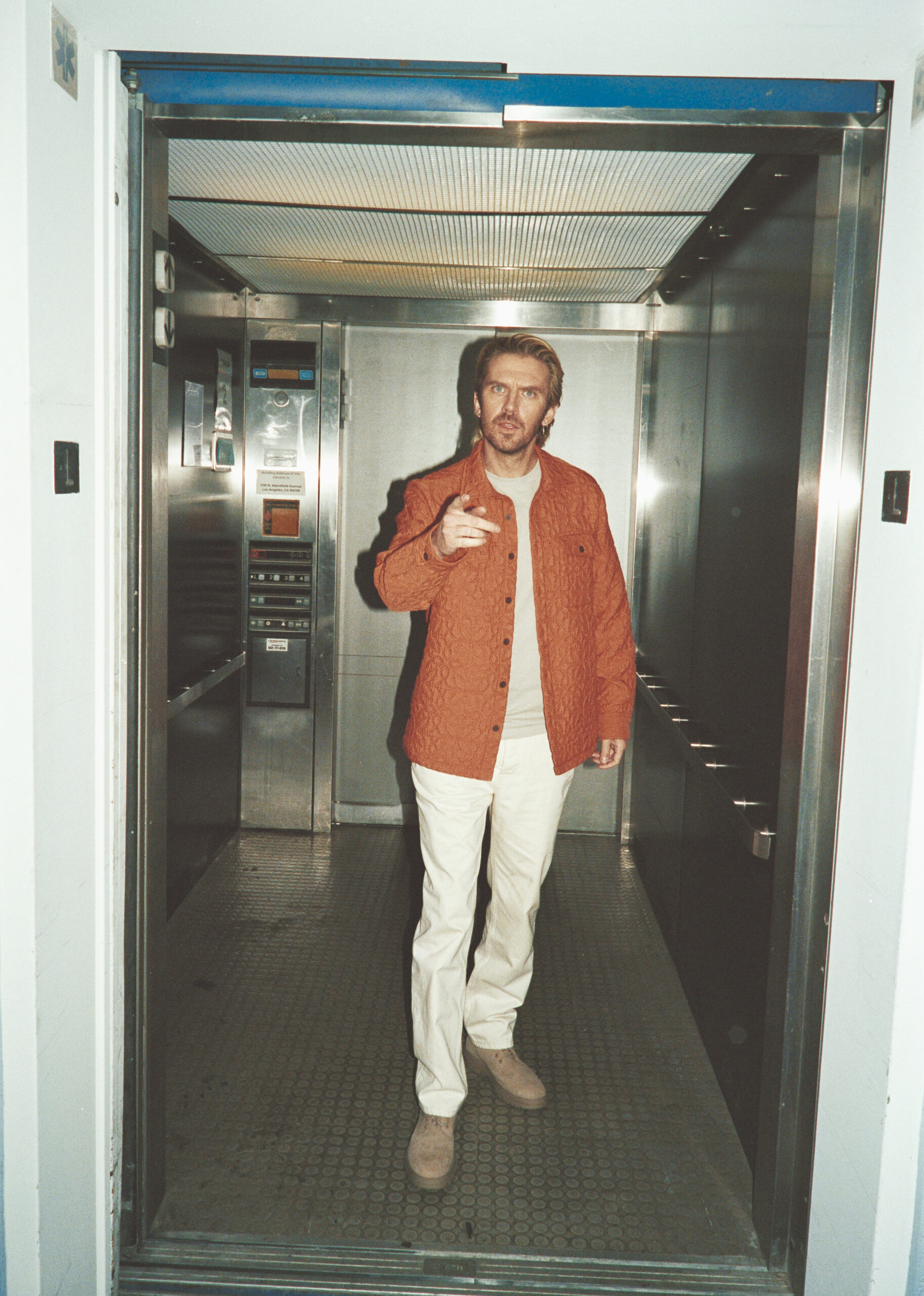
SMART: It’s true.
STEVENS: I don’t know what handsomeness, whatever that is, means. But for me, there’s got to be something behind the eyes, something going on upstairs. But, it is fascinating meeting actors who haven’t done theater. They have a very different craft. I’ve really enjoyed working with American actors in the last decade and learning from their different techniques.
SMART: Actors always talk about working from the inside out, but there are certain benefits to also working from the outside in. Like when you played the Beast.
STEVENS: Yes. Upside down and inside out on that one. That was a new frontier in terms of not knowing what my outside was going to look like until at least 18 months.
SMART: That had to be so strange.
STEVENS: I assume you must’ve seen the image of me walking down the stairs with this mocap suit on. It’s absolutely bonkers. But yes, it required an untapped well of imagination to really go at it.
SMART: You were so impressive when we did Legion.
STEVENS: I absolutely loved working on that show, not least for the amazing cast we had. I felt like all of us were playing multiple role. It was like, “Whatever you thought you were doing, turn it on its head.” And that kept all of us alive and engaged.
SMART: I remember there was one set where the floor was painted like an Escher painting. I couldn’t keep my balance. I was afraid to walk across the room.
STEVENS: It was genuinely mind-bending to create, and I think that show continues to be enjoyed by a lot of people.
SMART: Does it have a cult following?
STEVENS: What does that mean? I remember a friend of mine telling me that, “If you’re in something that’s cult, it means it didn’t make any money at the time.” But I think, yeah. It’s things that reward re-watching and that people want to continue to evangelize for years.
SMART: You think people get high when they watch the show?
STEVENS: Almost certainly. If they’re not ingesting something themselves, I think the show probably gets them a little high.
SMART: Do you want to stay in L.A., or do you just go back and forth all the time?
STEVENS: I’ve enjoyed being here a lot more than I thought I would. I think it was Legion that brought me here and I was surprised by the community that I found. It gets a bad rap, certainly back home in London. But the fact is there’s a lot of brilliant creatives in this town. It’s been amazing tapping into that a little bit. It excites me that this town is full of enthusiasm, and now almost more than ever, there’s a real desire to see production come back to Los Angeles. You get to shoot a little bit here with your show?
SMART: Almost everything here.
STEVENS: Do you pop to Vegas for a short burst?
SMART: Only twice in the four seasons. They CGI’d me onto the top of a tour bus in Vegas in season one.
STEVENS: Well, that’s amazing. I’m noticing more that people are trying to coax production back. I’ve been lucky that I’ve gotten to work here a lot as well.
SMART: Good for you. I’m going to spend the summer in New York doing a one-woman show.
STEVENS: Fantastic. Is it something that you’ve written and created?
SMART: It was brought to me a year or two ago. I love it so much. But it’s a big move going there, just house and dogs and all that stuff.
STEVENS: Yeah, of course. When was the last time that you were on stage?
SMART: I want to say it’s been over 20 years, but I keep thinking that can’t be. I think the only thing I’ve done on stage as a play since 2000 was a reunion of The Mannequin on Broadway, where the whole cast came back about 10 years ago to do a stage reading.
STEVENS: Oh, great. I’m very excited for your show. Especially if you live in L.A., it’s always a big upheaval going to New York, but I always say, if something really sparks, it’s worth doing. I keep looking for things. The last time I tried to do a play, we were interrupted by the pandemic. We did 13 previews of Martin McDonagh’s Hangmen.
SMART: Oh my god.
STEVENS: When the play came back, post-COVID, I was in a different place and couldn’t rejoin it sadly. I was gutted because I love being on stage. The idea of a one-woman show—I’ve never done a one-man show. I don’t know how I’d feel about that.
SMART: I do eight different characters, but the vast majority of it is one woman. But then I’m her husband, I’m the neighbor, I’m the bartender, I’m an older couple who come to see her.
STEVENS: I should have to try and catch it if I’m back from Australia.
SMART: You have to come, honey. But we have to do something together again.
STEVENS: Wouldn’t that be lovely?
SMART: When was Legion?
STEVENS: I don’t even know. Time is such a screwy thing these days. When did we finish it? 2018?
SMART: Sounds longer ago than that, but maybe not.
STEVENS: It would’ve been between ’16 and ’18, I think. It remains such a treasured job for me in so many ways, the people and the kind of work that we got to do. Increasingly for me, it’s how these things are received. Not everything is going to be beloved. You can never guarantee that, but there’s a real fondness out there for that show.
SMART: We’re both so lucky we’ve gotten to do some really amazing projects.
STEVENS: Hacks is such a treat. I keep holding out for that cameo somewhere.
SMART: I’ve got to talk to the writers. You could be a Vegas pit boss or a blackjack dealer or something.
STEVENS: Or a show girl. Listen, I’m very versatile.
SMART: I was checking out your legs on the show. You have very cute legs. Was it good working with De Niro?
STEVENS: Oh, my god, yes. Have you met him?
SMART: I was in a movie with him years ago. I had a tiny part, and our characters said, “Hello, nice to meet you,” or something like that. Then I chatted briefly with him on the set one day. But that was it.
STEVENS: What was the movie?
SMART: It’s called Mistress. It’s actually very good.
STEVENS: I’ve never seen it.
SMART: I was Danny Aiello’s girlfriend.
STEVENS: I will watch that. De Niro was incredible. I met him a little bit before we started shooting, and we had a Zoom chat. Then I met him in his very intimidating office in Tribeca. His walls are lined with pictures of him with absolutely everyone you can think of. I had the huge privilege of meeting Catherine O’Hara and halfway through chatting, she said, “Oh, wait, you were in Zero Day.” Then we were talking about Niro, I said, “Have you worked with him?” And she said, “No, but I did audition with him once.” He was attached back in the day to play the Tom Hanks role in Big, and she had auditions to play his opposite lady.
SMART: When you hear casting stories like that, it’s so funny. It’s like Rocky. And whatever you might think about Sylvester Stallone, I’ll always tip my hat to him for that movie.
STEVENS: Absolutely.
SMART: When he wrote it, he was a starving actor with a pregnant wife. Every studio in town wanted that script, and he said, “I either star in it or that’s it.” And he stuck to his guns. But you know who they wanted? Ryan O’Neal, because he was the hot guy of the month.
STEVENS: Yeah.
SMART: He was really hot right then.
STEVENS: It’s so funny how casting works, how so-called heat works, and the sort of influence that has. I love the story that Tom Selleck was almost Indiana Jones.
SMART: I can kind of see that.
STEVENS: But a very different direction. And of course, Ryan O’Neal is a very different Rocky.
SMART: They do much less of that in the UK, don’t you think? In America, they’ll cast people in movies sometimes who really are not right, but they’re very popular.
STEVENS: Right.
SMART: Then if the movie doesn’t do well, they say, “See? Nobody wants to see that kind of movie.” You go, “Well, no, you just didn’t execute it properly.”
STEVENS: Because everyone’s always trying to unpack what happened in success or in failure. But these days you hear stories about people being cast because they have a certain number of Instagram followers, and that’s terrifying.
SMART: That’s very alarming.
STEVENS: It’s trying to put a metric on the popularity that you’re talking about, and it just doesn’t work. What I like is the unquantifiable element of what we do. But of course, when there’s big money involved and lots of risk, everyone wants the three point average. It’s so bizarre. It makes you shudder to think that you’re churned into an algorithmic spreadsheet.
SMART: I was talking to a casting director recently, and I said, “Do you notice a difference in say, the auditions of really young actors these days?” Because their whole social life is on their phone. They meet on their phone, they date on their phone, they break up on their phone. You know what I mean?
STEVENS: Yeah.
SMART: I said, “If they come in to do an audition where there’s a scene of a very emotional, painful scene, or a very difficult, awkward conversation,” I said, “If they’ve never even had those kind of conversations, literally physically never had those kind of conversations, isn’t that kind of frightening?” And she said, “Oh, my god. You’re so right.”
STEVENS: That’s fascinating. To an extent, we’re always imagining, “Oh, I’ve never been in this. I’ve never had a fight with a guy in a gas station, but here we are playing the scene.” But you’re right, there’s real-world interactions. Or just living life.
SMART: You’ve got so much ahead of you. It’s funny because it wasn’t until I was 60 that I started getting these really fantastic roles. And I’m thinking, “What? I feel like I’m the same actor. I don’t know what happened.” I’m not complaining, but it’s just weird.
STEVENS: No, sure. But that’s what I meant with the different phases. And certainly, you’ve hit such a rare seam of incredible roles and work as a result. It’s really exciting because it can come from anywhere at any time. It’s not like the only great roles of a 25-year olds or something. It gets better I think.
SMART: I don’t know why but it just sort of blew up especially in the last five years. I don’t necessarily love being the poster child for older actresses.
STEVENS: It’s fantastic though, Jean. I love it. And I love watching your work and I’m excited to see this next season. Really, the way you left us hanging on that last one, it’s super juicy.
SMART: I just say what they tell me to say and stand where they tell me to stand.
STEVENS: That’s great.
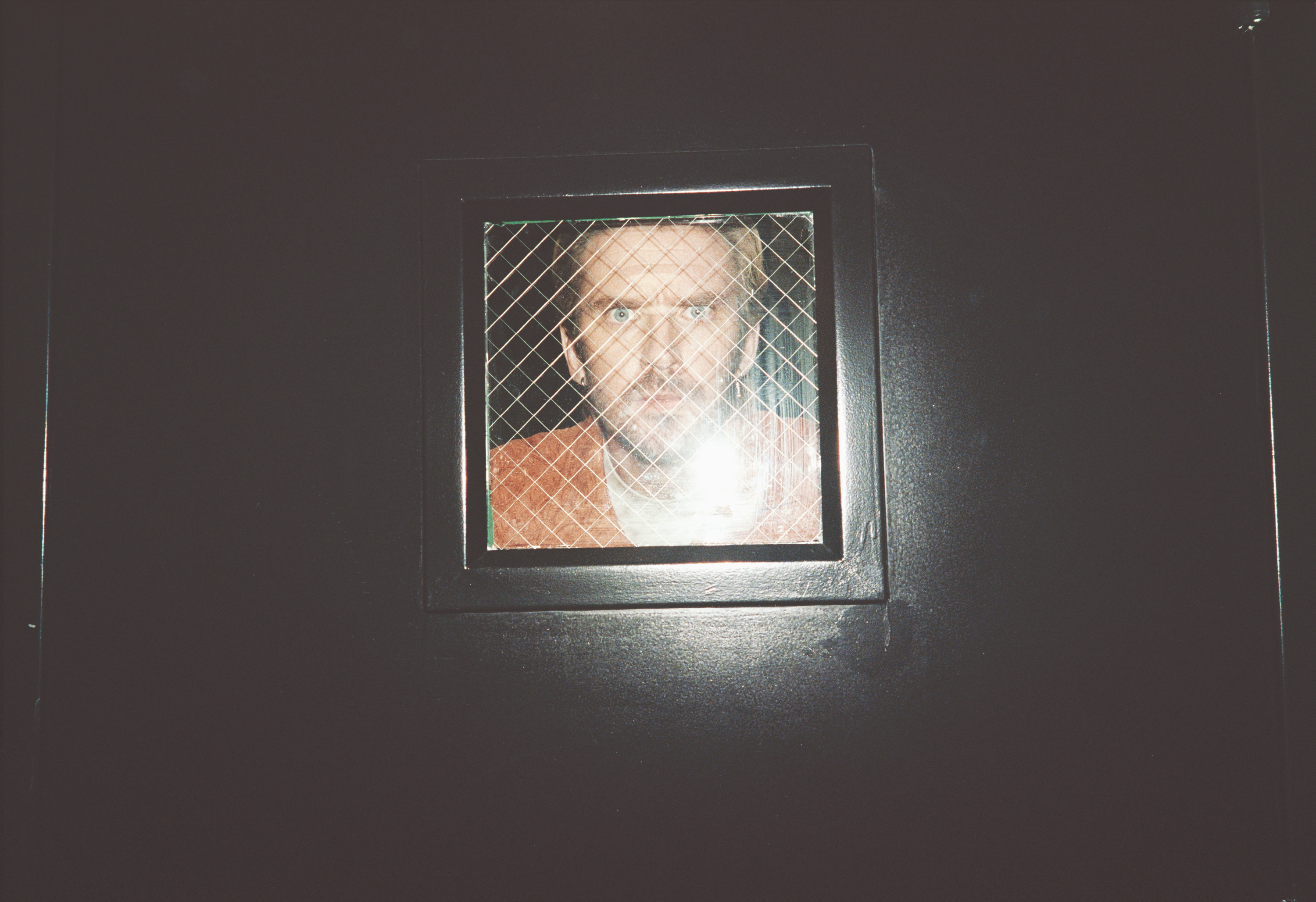
Grooming: Sonia Lee

